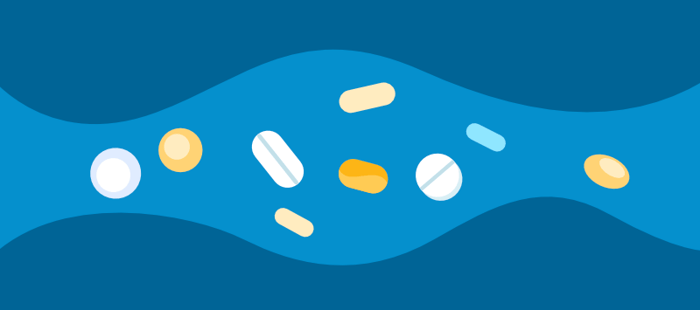Embracing a vegan lifestyle offers many benefits – from championing personal health to nurturing our planet. As more people are drawn to this compassionate and sustainable way of living, there's an increasing awareness of the importance of a well-balanced vegan diet.
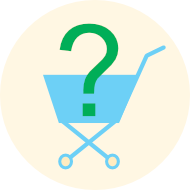
Yet, diving deep into veganism often brings a unique set of nutritional challenges. As you sidestep certain food groups like meat and dairy, you must also ensure you're not missing out on crucial vitamins and minerals. The silver lining? With the proper guidance, embracing veganism without compromising on nutrients becomes a delightful journey, not a daunting task.
Let's embark on a deep dive into the 9 indispensable supplements for vegans and explore how to seamlessly integrate them into your daily routine.
Top 9 Supplements For Vegans
1. Vitamin B-12
Role and Importance: Often topping the list of supplements for vegans, Vitamin B-12 is pivotal for DNA synthesis and the formation of red blood cells. A deficiency can manifest as megaloblastic anemia, characterized by fewer, enlarged red blood cells, leading to symptoms like fatigue and weakness.
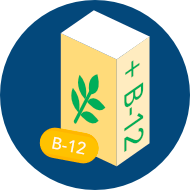
Why Vegans Need It: Unlike other nutrients, Vitamin B-12 primarily originates from animal sources such as meat, dairy, and seafood. This makes it a key concern for those who've embraced a plant-based lifestyle.
Vegan-Friendly Sources: While direct dietary sources might seem limited, vegans can turn to fortified foods like certain cereals and nutritional yeast to bolster their B-12 intake.
Yet, dietary supplements often become the go-to for consistent and optimal intake. The general recommendation stands at 2.4 mcg of Vitamin B-12 daily, but vegans might consider a slightly higher dose to ensure effective absorption and utilization in the body.
2. Vitamin K-2
Role and Importance: Vitamin K-2 plays a pivotal role in our health. While it's instrumental in maintaining bone health, it's equally essential in shielding our body against chronic ailments, including heart disease and cancer. It's the less-mentioned sibling of Vitamin K-1, but it's equally, if not more, significant.
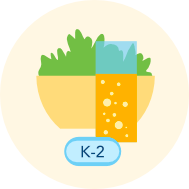
Why Vegans Need It: The tricky aspect of Vitamin K-2 is its primary presence in animal-based foods. So, while Vitamin K-1 might be a regular feature in a vegan's plate, thanks to green, leafy vegetables, K-2 often gets sidelined. This makes it imperative for vegans to be conscious of their Vitamin K-2 sources, ensuring they don't miss out on its benefits.
Vegan-Friendly Sources: Veganism has its treasures, and when it comes to Vitamin K-2, fermented foods wear the crown. Items like kefir, sauerkraut, and kombucha owe their Vitamin K-2 content to the magic of fermentation. But if these fermented delights aren't a regular feature in your diet, considering a Vitamin K supplement might be wise. Remember, Vitamin K thrives in the presence of fats. So, to maximize absorption, consume it alongside healthy fats like olive oil or walnuts.
3. Protein
Role and Importance: Protein is often dubbed the foundation of our physiological processes. Serving as the "building blocks" of our body, they're indispensable for many functions, from ensuring robust muscle mass, to crafting enzymes and synthesizing hormones. The significance of protein transcends dietary preferences; whether you're vegan or an omnivore, your body's protein requirement remains unchanged.
Why Vegans Need It: The common misconception surrounding veganism is the supposed protein deficiency. While it's true that most traditional sources of protein are animal-derived, a well-planned vegan diet isn't necessarily protein-deficient. The challenge lies not in the absence of protein-rich vegan foods but in ensuring that they deliver all essential amino acids since most plant-based proteins are incomplete.
Vegan-Friendly Sources: The plant kingdom is abundant with protein-rich foods, from grains and nuts to legumes. The key to a protein-rich vegan diet lies in the art of combination. For instance, coupling corn with beans provides the spectrum of amino acids your body needs. Complete protein sources like soy exist, but they may necessitate a more strategic inclusion in daily meals. If striking this balance seems elusive, vegan protein supplements derived from peas, soy, hemp, or chia seeds can be a game-changer, especially for those aiming to augment muscle mass.
4. Zinc
Role and Importance: Zinc, a crucial mineral, interplays with diverse physiological systems. From hastening the healing of wounds to supercharging your immune system against common ailments, its relevance in maintaining optimum health is undeniable.
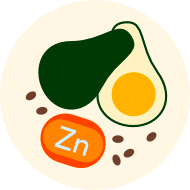
Why Vegans Need It: The narrative of zinc in a vegan diet is intricate. It's not about the absence of zinc in plant-based foods but more about the bioavailability. Plant-based zinc sources often come with a hitch: they contain phytates, which can hamper the body's absorption of zinc. Hence, even if you're consuming foods rich in zinc, you might not be benefiting from it as much as you think.
Vegan-Friendly Sources: From the plant realm, seeds, nuts, legumes, and vegetables like potatoes are your go-to for zinc. However, considering the absorption challenges, it's wise to strategize. The recommended daily intake is 12 mcg for women and 21 mcg for men. A daily zinc supplement can bridge this gap if you're doubtful about meeting these through diet alone. Many vegan multivitamins conveniently include zinc, simplifying the supplementation process.
5. Iron
Role and Importance: Iron stands as a cornerstone for our blood health. Integral to the synthesis of hemoglobin, this mineral facilitates oxygen transport via red blood cells. An inadequate iron intake can culminate in anemia, an ailment characterized by pervasive fatigue, pronounced weakness, and perpetually cold extremities.
Why Vegans Need It: The distinction between heme and non-heme iron is pivotal. While heme iron, notorious for its superior absorption rate, is exclusive to animal-derived foods, non-heme iron graces certain plant-based offerings. But herein lies the rub: the human body doesn't absorb non-heme iron as efficiently. This differential absorption puts vegans and vegetarians in the spotlight for potential iron deficiencies.
Vegan-Friendly Sources: Fortifying your vegan diet with iron isn't Herculean. Non-heme iron generously resides in spinach, beans, lentils, nuts, and seeds, with some fortified foods joining the ensemble. However, given its absorption quirks, you might need to increase your intake of these iron-abundant foods. Alternatively, an iron supplement can be a fail-safe to ensure you achieve your daily recommended intake seamlessly.
6. Omega-3s
Role and Importance: Omega-3s are essential fatty acids that play a key role in our overall health, especially for the brain and cardiovascular system. They are known to support heart health and boost brain function, largely because of their potential anti-inflammatory properties.*
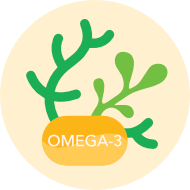
Why Vegans Need It: Our body can't produce omega-3s on its own, so we need to get them from our diet. There are three main types of omega-3s: EPA, DHA, and ALA. EPA and DHA are important and directly benefit our health, but they are mainly found in oily fish, which is a challenge for vegans.
Vegan-Friendly Sources: Vegans can get the ALA type of omega-3 from foods like chia seeds, walnuts, flax, and hemp. However, to get the benefits, our body needs to convert ALA to EPA and DHA, and this process isn't always efficient. A great solution for vegans is algae-based Omega-3 supplements. These supplements, sourced from algae, are rich in EPA and DHA, making them an excellent option for those following a plant-based diet.
7. Iodine
Role and Importance: Iodine plays a pivotal role in our health due to its involvement in the production of thyroid hormones. These hormones regulate our metabolism. Insufficient iodine can lead to issues like goiter, which is a swelling of the thyroid gland.
Why Vegans Need It: Acquiring enough iodine naturally can be challenging, as many primary sources are animal-derived, like eggs, seafood, and milk. Since plant foods don't reliably supply iodine, vegans must be particularly mindful.
Vegan-Friendly Sources: For those following a plant-based diet, seaweed emerges as an excellent source of iodine. Additionally, to counteract the general difficulty of obtaining iodine from natural sources, some foods and seasonings, such as table salt, are fortified with iodine. Checking labels and considering iodine-fortified options can help ensure you meet your daily requirements.
8. Calcium
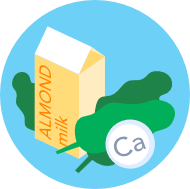
Role and Importance: Calcium is a fundamental mineral that largely contributes to the strength and structure of our bones and teeth. Maintaining adequate calcium levels is vital as this mineral is a pillar for skeletal health. A deficiency, termed hypocalcemia, can lead to fragile bones that are more prone to fractures, a condition that becomes increasingly concerning with age.
Why Vegans Need It: While dairy products, such as cow's milk, are typically associated with calcium, they aren't consumed in a vegan diet. However, vegans have many other sources to derive this essential mineral from.
Vegan-Friendly Sources: Plant-based milk alternatives, like almond and soy milk, are often fortified with calcium, making them a good substitute. Additionally, foods such as leafy greens and tofu naturally contain calcium. If there's a concern about not meeting the daily requirement, calcium supplements or multivitamins are an effective option to consider.
9. Vitamin D
Role and Importance: Often termed the "sunshine vitamin," Vitamin D plays a pivotal role in maintaining various aspects of our health. From bolstering bone strength in conjunction with calcium to supporting mental well-being and muscle function, the significance of this vitamin cannot be understated.
Why Vegans Need It: While our bodies can synthesize Vitamin D through skin exposure to sunlight, relying solely on this method isn't always sufficient, especially in regions with less sunlight or during winter months. Moreover, many natural food sources of Vitamin D come from animal-based products, which makes it a bit challenging for vegans.
Vegan-Friendly Sources: Thankfully, vegans have alternatives. Plant-based supplements derived from lichen or mushrooms are rich in Vitamin D. Additionally, fortified plant-based milk and cereals often contain this vitamin. While spending time outdoors and soaking up some sun can aid in natural Vitamin D production, it's important to practice sun safety by wearing sunscreen and avoiding prolonged exposure during peak hours.

